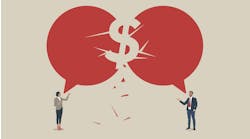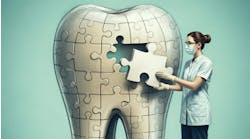by Richard Reinitz, DDS, MBA, FAGD
One of the greatest issues facing this country is the cost of health care. So, what insight can a dentist offer into this conversation that health experts, economists, and politicians haven’t already covered? To begin with, I am a consumer of health care and have been the responsible individual for purchasing health insurance for my group of 12 people for more than 20 years. I purchase health insurance products to meet the needs of my team — I know because I’ve asked them what they want. They need access both to their physicians and medications at an affordable out-of-pocket price. Second, I would defy any so-called health expert to compete with the knowledge we dentists have in linking economics and dental care. Virtually every treatment decision a patient makes is tainted with money. Patients often regard their teeth as both disposable and replaceable, thus the value judgment to save or remove a tooth often comes down to the cost. We dentists are accustomed to patients who request the removal of permanent teeth from dependent children because the cost of restoration is viewed as too high.
Yes, we dentists understand the economics of medicine and, even more ironic is the notion that, in essence, the dental insurance model would supplant the current medical insurance model. Our politicians and health-care experts want to make patients more responsible for their care, which really means more out-of-pocket expense. In dentistry, we already know what happens: the patient will often elect less care — or no care — than they need because they will have to pay for it. Does this control cost? Of course it controls cost because less money is spent because less care is delivered. Is the patient better off? Of course not, but the bottom lines of insurance companies and employers does, in fact, improve.
As reliable as the sunrise, with no waiting
Every year on January 1, I can count on an increase in my health-care insurance premium for myself and my team, just as I have had every year since the inception of our group plan 20 years ago. Although the names of the insurance carriers have changed along with the benefits, the one constant is the ever-increasing premium. Therefore, it is with great interest that I watch the current debate over health care. For some, the issue is to provide health insurance to those who do not have it; for others, the main issue is cost containment; for still others, it is both. Socialized programs in Europe and Canada are lauded for their universality of coverage, but they are simultaneously criticized for their limited access and long waiting periods. As Americans, we love the concept of full insurance coverage, especially if it’s “free,” but cringe at the thought of waiting for anything. We live in the land of “fast” — fast food, fast cars, and fast and convenient service. We don’t just get “take out,” we get it delivered. Banker’s hours are now 24/7. We are not going to wait for months or years for medical care nor will we relish the opportunity to funnel patients into facilities out of efficiency without a thought to convenience or reasonable access.
The Conundrum
Our current system is overburdened and overtaxed. In this country we do not have a government health-care system to blame for problems in coverage; we have our employers and, most of all, our insurance companies. Virtually anyone who visits a hospital or physician’s office can attest that our facilities and medical personnel are overwhelmed with patients. Less obvious perhaps is the reason for this congestion. The simple truth is that insurance companies primarily, and to a lesser extent, government through Medicare and Medicaid, have cut fees so severely that it is only through sheer high volume that medicine can be profitable. But the increased volume means increased risk of medical mistakes and demonstrable decreases in human contact between physicians and their patients. Eventually, medicine will become to patients what factories are to cars — efficient, cold, and measured in “tolerable defects per thousand.”
What we have now is the extrication of health care from the capitalist system. Capitalism rewards or punishes based on performance and demand, and since what we now have is essentially price control, there is no reward for better performance, i.e., better care, and since better care requires more time, performance is punished. So clearly, medical care suffers but price controls do work for the insurance companies. By capping fees, insurance companies preserve their profits at the expense of the providers. The solutions proposed to alter this outcome are a) global and inefficient socialized medicine, b) permit patients to be more active in their care through expansion of health savings accounts (HSAs), or c) permit individuals to purchase their own health insurance with pretax dollars.
Anyone who needs convincing that socialized medicine is not the answer needs only to view the demise of socialism that is crushing Europe. Europeans have a massive unfunded liability for their aging population combined with burgeoning unemployment. There is no free lunch, especially when viewed from the prism of income tax rates that are upward of 70 percent! Universal health care provided through the funnel of the federal government will provide each of us equally with substandard care, but hey, we’ll all get it and it will be “free,” right? Free, of course, except for the extra billions of dollars in taxes we all will pay — not to mention the cost of wasted time and productivity as we wait in lines for care. Remember the long lines for food and goods in the former Soviet Union? Is that what we want for our health care?
More “choices” than we can afford
The notion that health care costs can be contained by giving patients more control by paying for routine health care needs themselves, such as doctor’s visits paid through HSAs, is equally nonsensical. First, there will still need to be some significant discount to enable patients to see their physicians. If the doctor’s visit is a $100 or $200 event, then most patients will not be able to afford to see their physicians. Again, look at this like the dental insurance model. Costs are controlled because less care is delivered — not because nonessential care is reduced, but because essential treatment is not done. The rationale seems to be as if the solution to reducing food costs is to buy less food, and the fact that you are left hungry is an acceptable trade off. If the fees are as discounted as they are in current copays, then the incentive for patients to control cost is removed.
Then there is the concept of saving sufficient funds to provide for routine care for an entire family. We Americans don’t save enough for retirement — or even to exist past our next paycheck — so how can anyone expect the concept of a health savings account to garner sufficient funds to do the job? The end result will be inadequate funds resulting in patients foregoing care, going into debt, or leaving providers with unpaid bills. The other supposed benefit of HSAs is that they are supposed to empower patients with choice. But how can patients make intelligent medical decisions just because they have a financial incentive? How many times in dentistry do patients make wrong or bad decisions with finances as the primary factor?
Does anyone really believe that if your physician recommends treatment or tests that require hundreds or thousands of dollars out of your pocket, and you, your spouse, or your child is ill, you will say, “No, I’m going to shop around”? Will you really look elsewhere to get the treatment or tests cheaper? Is there a parent who will actually have a child suffer for days while searching for cheaper care? I would suggest that anyone who makes these suggestions has never been up all night with a sick child. The problem is not that giving patients more power is a bad thing; the issue is the power to do “what.” All of us are empowered to make better choices in health care. These choices include our diet, exercise, consumption of alcohol, use of tobacco, and use and abuse of both legal and illegal drugs.
Why are we surprised?
The simple truth is that we Americans are overweight and consume excessive amounts of alcohol, tobacco products, and legal and illegal drugs. We abuse our bodies with too much fatty food, and then we’re surprised to find ourselves obese, diabetic, and hypertensive. We smoke cigarettes or consume other tobacco products and are surprised when we develop lung cancer, throat cancer, or suffer from cardiac disease. We imbibe vast quantities of alcohol and are surprised when we suffer from gastrointestinal illness or liver disease. We lead largely sedentary lives in front of our TV sets and then are surprised to learn that movement becomes difficult or impossible. Through it all, we expect medicine to cure us, despite our irresponsible behavior and, by the way, we further expect to not have to pay very much for our medical care. If we just took better care of ourselves we would need less, not more, medical care; we would need less, not more, medication.
So, what’s the answer?
Simply stated, the answer is — us! We need a carrot-and-stick approach, in that we need to encourage people to get healthier, lose weight, exercise more, eliminate tobacco use, and reduce or eliminate the use of alcohol. We need to give people the tools and the time to change their habits and, when they do, reduce their health insurance premiums and give them priority for services. That’s the “carrot” part. But there must also be a “stick.” Failure to change behavior must necessarily result in those people paying more for their health care, and they must necessarily go to the back of the line when it comes time for expensive and specialized care such as organ transplants. People who will not alter their behavior can no longer expect others to subsidize their health care costs when they will not make good-faith efforts to make themselves healthier. Of course, this would not apply to cases where the patients are children or people suffering from congenital diseases, or from diseases not strictly behavior based. Those exceptions notwithstanding, there is a vast pool of patients who will become diseased as a consequence of long-term bad choices, and if we can contain or reduce that pool, health care costs may come down.
Wow. That’s not what we wanted to hear, but ...
This is not a popular approach and goes against the essence of freedom that we cherish in this country. Some would argue that it is the individual’s right to eat, drink, and smoke to excess and I would agree, but I do not believe I should have to pay for the consequences of those behaviors. Make no mistake, the biggest consumers of health care — the biggest abusers of this excess — are subsidized by those of us who make conscious efforts to lead healthier lives.
Drivers know if they receive multiple speeding tickets or are involved in numerous car accidents, they will pay higher premiums than those who do not receive speeding tickets or are not involved in car accidents. Higher-risk individuals pay more or, alternatively, cannot obtain car insurance, perhaps resulting in the loss of the use of their cars.
No one is heard arguing for the “right” to drive a car or the “right” to obtain car insurance. No one seems to have a problem with higher-risk individuals paying more for their car insurance. In fact, all insurance products except health insurance work the same way and are priced according to risk and, in most cases, do not assume guaranteed issuance.
This may seem a harsh or unfeeling approach to solving our health care crisis, particularly if this applied to our families, friends, or ourselves, but it is not only practical, it is the only real solution we have. We can continue to arbitrarily contain costs by taking money off the table, but can we really expect better results?
We have the power and the opportunity to lead healthier, longer lives and unfortunately, those worthy goals are still insufficient to motivate us, so perhaps the incentive can be money: take better care of yourself and you lower your health insurance cost, or go the other way and pay much more out of your pocket. Perhaps when faced with choosing between a new car, house, appliances and vacations, or having health insurance — or even health care, for that matter — maybe we will make better choices.
Dr. Richard Reinitz has been in private practice in Houston for nearly 25 years. He has completed a General Dental Residency at the Veterans Administration in Philadelphia and a Prosthodontic Residency at the VA in Houston. In addition to attaining his FAGD, he also obtained an MBA from the University of Houston in 1990. He may be reached by calling (281) 481-3838, or via e-mail at [email protected].





